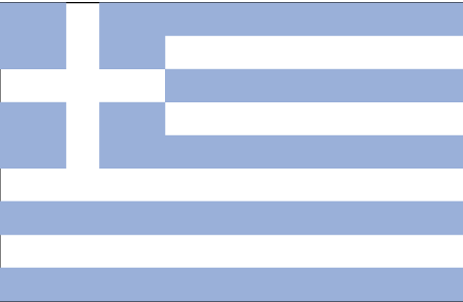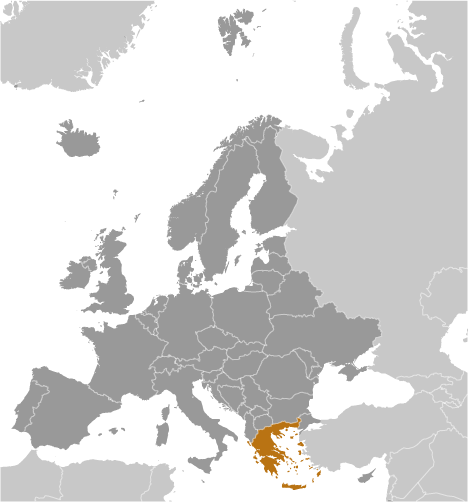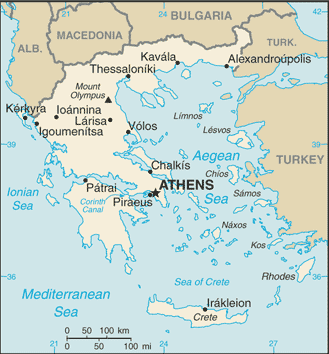Greece achieved independence from the Ottoman Empire in 1829. During the second half of the 19th century and the first half of the 20th century, it gradually added neighboring islands and territories, most with Greek-speaking populations. In World War II, Greece was first invaded by Italy (1940) and subsequently occupied by Germany (1941-44); fighting endured in a protracted civil war between supporters of the king and Communist rebels. Following the latter's defeat in 1949, Greece joined NATO in 1952. In 1967, a group of military officers seized power, establishing a military dictatorship that suspended many political liberties and forced the king to flee the country. In 1974, democratic elections and a referendum created a parliamentary republic and abolished the monarchy. In 1981, Greece joined the EC (now the EU); it became the 12th member of the European Economic and Monetary Union in 2001. In 2010, the prospect of a Greek default on its euro-denominated debt created severe strains within the EMU and raised the question of whether a member country might voluntarily leave the common currency or be removed.
Country Name
Conventional long form:Hellenic Republic
Conventional short form: Greece
Local long form:Elliniki Dhimokratia
Local short form:Ellas or Ellada
Former:Kingdom of Greece
Government Type
parliamentary republic
Capital
Name:Athens
Geographic coordinates: 37 59 N, 23 44 E
Time difference:UTC+2 (7 hours ahead of Washington, DC during Standard Time)
daylight saving time: +1hr, begins last Sunday in March; ends last Sunday in October
Administrative divisions
51 prefectures (nomoi, singular - nomos) and 1 autonomous region*; Achaia, Agion Oros* (Mt. Athos), Aitolia kai Akarnania, Argolis, Arkadia, Arta, Attiki, Chalkidiki, Chanion, Chios, Dodekanisos, Drama, Evros, Evrytania, Evvoia, Florina, Fokidos, Fthiotis, Grevena, Ileia, Imathia, Ioannina, Irakleion, Karditsa, Kastoria, Kavala, Kefallinia, Kerkyra, Kilkis, Korinthia, Kozani, Kyklades, Lakonia, Larisa, Lasithi, Lefkas, Lesvos, Magnisia, Messinia, Pella, Pieria, Preveza, Rethynnis, Rodopi, Samos, Serrai, Thesprotia, Thessaloniki, Trikala, Voiotia, Xanthi, Zakynthos
Independence
1829 (from the Ottoman Empire)
National Holiday
Independence Day, 25 March (1821)
Constitution
11 June 1975; amended March 1986 and April 2001
Legal system
based on codified Roman law; judiciary divided into civil, criminal, and administrative courts; accepts compulsory ICJ jurisdiction with reservations
Suffrage
18 years of age; universal and compulsory
Executive branch
Chief of state: President Karolos PAPOULIAS (since 12 March 2005)
Head of government:Prime Minister Yeoryios (George) PAPANDREOU (since 6 October 2009)
Cabinet:Cabinet appointed by the president on the recommendation of the prime minister
(For more information visit the World Leaders website)
Elections:president elected by parliament for a five-year term (eligible for a second term); election last held on 3 February 2010 (next to be held by February 2015); president appoints leader of the party securing plurality of vote in election to become prime minister and form a government
Election results: Karolos PAPOULIAS reelected president; number of parliamentary votes, 266 out of 300
Legislative branch
unicameral Parliament or Vouli ton Ellinon (300 seats; members elected by direct popular vote to serve four-year terms)
Elections:last held on 4 October 2009 (next to be held by 2013)
Election results:percent of vote by party - PASOK 43.9%, ND 33.5%, KKE 7.5%, LAOS 5.6%, SYRIZA 4.6%, other 4.9%; seats by party - PASOK 160, ND 91, KKE 21, LAOS 15, SYRIZA 13
Judicial branch
Supreme Judicial Court; Special Supreme Tribunal; all judges are appointed for life by the president after consultation with a judicial council
Political Parties and Leaders
Coalition of the Radical Left or SYRIZA [Alexis TSIPRAS]; Communist Party of Greece or KKE [Aleka PAPARIGA]; Democratic Revival [Stelios PAPATHEMELIS]; Ecologist Greens [Nikos CHRYSOGELOS]; Fighting Socialist Party [Nikos KARGOPOULOS]; Greek Ecologists [Dimosthenis VERGIS]; New Democracy or ND [Antonis SAMARAS]; Panhellenic Socialist Movement or PASOK [Yiorgos PAPANDREOU]; Popular Orthodox Rally or LAOS [Yioryios KARATZAFERIS]; Union of Centrists [Vassilis LEVENTIS]
Political pressure groups and leaders
Civil Servants Confederation or ADEDY [Spyros PAPASPYROS]; Federation of Greek Industries or SEV [Dimitris DASKALOPOULOS]; General Confederation of Greek Workers or GSEE [Ioannis PANAGOPOULOS]
International organization participation
Australia Group, BIS, BSEC, CE, CERN, EAPC, EBRD, EIB, EMU, ESA, EU, FAO, FATF, IAEA, IBRD, ICAO, ICC, ICCt, ICRM, IDA, IEA, IFAD, IFC, IFRCS, IHO, ILO, IMF, IMO, IMSO, Interpol, IOC, IOM, IPU, ISO, ITSO, ITU, ITUC, MIGA, MINURSO, NATO, NEA, NSG, OAS (observer), OECD, OIF, OPCW, OSCE, PCA, Schengen Convention, SECI, UN, UNCTAD, UNESCO, UNHCR, UNIDO, UNIFIL, UNMIS, UNWTO, UPU, WCO, WFTU, WHO, WIPO, WMO, WTO, ZC
Diplomatic representation in the US
Chief of mission: Ambassador Vassilis KASKARELIS
Chancery:2217 Massachusetts Avenue NW, Washington, DC 20008
Telephone:[1] (202) 939-1300
FAX:[1] (202) 939-1324
Consulate(s) general:Boston, Chicago, Los Angeles, New York, San Francisco, Tampa
consulate(s): Atlanta, Houston, New Orleans
Diplomatic representation from the US
Chief of mission:Ambassador Daniel V. SPECKHARD
Embassy:91 Vasilisis Sophias Avenue, 10160 Athens
Mailing address:PSC 108, APO AE 09842-0108
Telephone: [30] (210) 721-2951
FAX: [30] (210) 645-6282
consulate(s) general: Thessaloniki
Flag description
nine equal horizontal stripes of blue alternating with white; a blue square bearing a white cross appears in the upper hoist-side corner; the cross symbolizes Greek Orthodoxy, the established religion of the country; there is no agreed upon meaning for the nine stripes or for the colors; the exact shade of blue has never been set by law and has varied from a light to a dark blue over time










